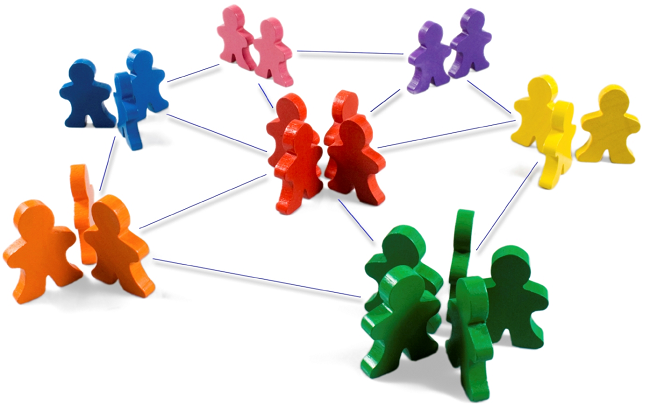In my own experience, I applied what I learned in chapters 11 & 12 of our book to how I facilitate change in a student organization I'm in. In revising our vision statement , it's important to talk with everyone first to let them know, then make them feel included in the process. One girl couldn't be at the meeting, so we sent her the Minutes of what happened, then she emailed us her thoughts. I learned to be inclusive, how to make people feel comfortable with change and how important it is to explain the process to them. I also think it is necessary for it to be a democratic way of enabling change. If someone is particularly opposed to something the group is doing, they should have the right to express their feelings. Finally, change is great but it is just as great to prove to your organization what you accomplished. Something concrete, that your members can see, proves to them that the change was a good idea, and they can feel proud that the organization as a whole is improving.
Aware of myself: I am so happy I took the Myers-Briggs Personality Type Indicator. I am for sure an ENFJ and I think having that self-knowledge helps me in a key areas. First, I am more aware of my weaknesses. I'm socially aware but I can be oversensitive. This is important for me to know; sometimes in a fight when my feelings are hurt, I need to take a step back and think. Perhaps this is my over-sensitivity to conflict stepping in. I can also have issues with control. One of my strengths for StrengthsQuest is woo, but it can have the negative connotation of manipulation. As a leader, I need to rely more on others, and work on delegating and trusting others to do work. I would much rather take on all the responsibility myself, because I know I'll actually get it done, and do it the way I want. This is bad! I need to allow others to improve themselves and the organization by having responsibility and doing something great, and also have less pressure and work on myself.
I am also more aware of my strengths. Break-ups suck, they really do. I have girl friends who waste so much energy and emotions over ex-boyfriends. Luckily, my ENFJ personality allows me the ability to process what happened, what went wrong, and move on. Do I cry? Definitely. Do I think about the relationship? Unfortunately, yes. But I don't dwell on the past. I have a positive and optimistic outlook that keeps me looking forward. I'm also good at bringing out the best in others. I love motivating people and helping them realize their potential. I love working with others and seeing people produce their best work. I'm good at encouragement and I try my hardest to be a reliable and supportive friend.
What's different: I never really thought about Ethics in Leadership. I knew you ought to have a moral compass and know the difference between right and wrong, but I didn't appreciate the importance of ethics. Yet, our book wrote as #1 in the 8 Assumptions of Ethical Leadership that Ethics is the heart of Leadership. I feel more educated about Ethics and Morals(and the difference), as well as how important it is in using Ethics to be a successful leader.
Ethics isn't just useful for me as a leader, but for the organizations I am involved in. Assumption #3 is that Personal Values intersect with Organizational Values. I think it would help a group grow stronger if they got together and did an Ethics workshop or training. Ethics can be tricky; there is no right or wrong answer. Often, I ask myself "What do I do??" But I am not the only one. I love that I have a support network within my organizations. I never feel like I am alone in making a tough call. I can work with my team to develop my thoughts and plan out my decision before I make it.
Continuing my Leadership Learning: Yay Leadership! Hopefully I will continue to develop my skills for my whole life. In the near future, I am hoping to take some more Leadership Classes through Ohio State, because they're awesome! I wish there was time in my schedule for a minor. I will also continue to improve the organizations I am involved in, and better focus my efforts. I'll be attending more Conferences and hopefully facilitating workshops through my involvement with Student Leadership Advocates. I also hope to learn from some of the fabulous upperclassmen friends I have, who are dedicated and strong leaders on campus and set perfect examples of what I want to be. Hopefully, they can teach me something!
Beyond my Ohio State career, I have no idea what I will be doing, but I plan on always working with people and being a leader. I definitely want to work in another country, perhaps I'll be advocating for women's rights in India. Then I could be a leader while inspiring other women to be leaders as well. That's my dream, anyway. I could also see myself getting my Masters in Education and being a leader in the classroom. I want to work with children and be a positive influence on them. Since I'm good at encouragement, I can hopefully use my ENFJ qualities to empower my students. If I do a good job, my students will succeed and be great people, which means I fulfilled my role as a teacher.
My own philosophy of leadership: As of right now, my philosophy of leadership is pretty simple: Listen, love, support, and achieve.If you do all of these things, I think you will be a special and wonderful leader. There is no cookie-cutter form or right answer on how you'll be great, but this is how I live my life. Listening is key; you have to pay attention to everyone in your group. I am very focused on inclusiveness and I want everyone to feel like they are a part of the organization. I think love is very general, but it isn't talked about enough. Love yourself and others. Love what you're a part of. Love what you're doing. Love what you see happening in the future. Support for yourself and members is crucial. It's important to have "me" time. Also, be there for your participants. When they need something, help them. When they're unsure, guide them. When they're nervous, encourage them. Everyone does better knowing that they have someone behind them, who is there to catch them if they fall. Finally, accomplish something. Being a part of some prestigious group is great; but what do YOU do? It is such a rewarding feeling to look back on your involvement and have done something that people remember, that made an impact.
I don't see my view on leadership as static. I hope that through my development as a leader and growth as a person, I will one day look back on this blog post and chuckle at how different my philosophy is. I still hope the core concepts are there: value your members and their input, be passionate about your cause, help others, and be successful. I want to make an impact on the world, create a positive change, so I plan on using my philosophy to get me there. I included this video because I love this song and it's all about love and hope and the unknown future. And Gwyneth Paltrow is really good covering the Fleetwood Mac classic.
I have had a fabulous class with you all and I really look forward to reading your last posts. Good luck on finals, everyone! And just because the class is over doesn't mean we can't still be friends. I'm here for all of you if you ever need me :)





















